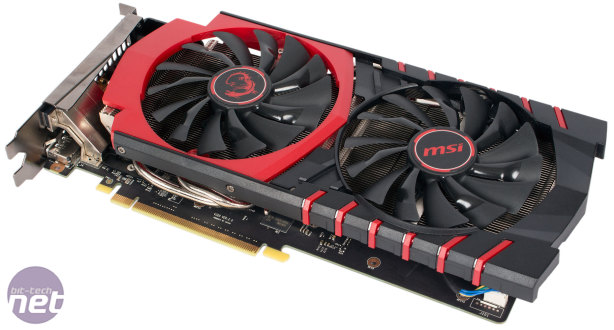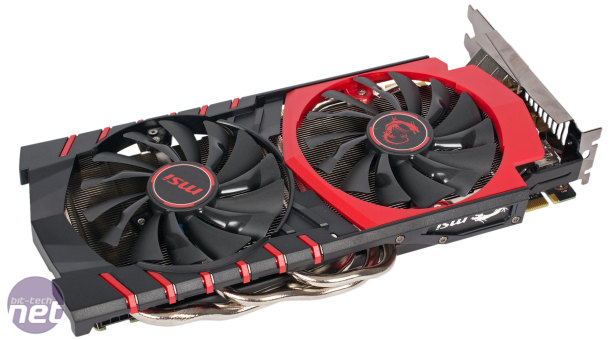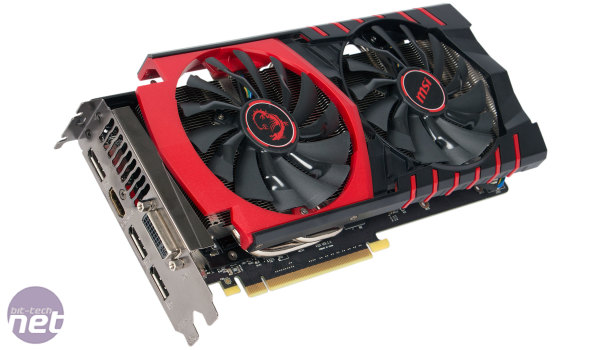
Performance Analysis
With its slightly lower clock speeds, it's no surprise to see the MSI GTX 960 Gaming typically give results 1 or 2fps below the speeds reached by the other GTX 960 we've seen, the Strix model from Asus, and thus a little closer to the performance of a GTX 760. In Battlfield 4, this sees it slip just behind the R9 280 at 1080p, though it's still smooth here and even technically playable at 1440p – though you'll need to turn down settings somewhat at this resolution, however, as 25fps in a fast-paced game like this is limiting.In BioShock Infinite it's easily above 60fps and just manages to trump the R9 285 and R9 280 at 1080p. At 1440p, it falls to just below the former but stays ahead of the latter. However, we're talking differences of 1fps here, so it's effectively the same experience on all three.
In Crysis 3 performance is as expected, though at 1440p it drops from a 25fps minimum to a 22fps minimum. We are potentially seeing the 128-bit memory bus being a limit here (the memory on the Asus card is slightly overclocked), but it's hard to say without further testing, and you wouldn't play at these settings anyway.
Our final game test is Skyrim, where the MSI GTX 960 Gaming has no issues and is mostly on par with the R9 280.
In Unigine Valley, the MSI card has a more signficant lead on AMD's hardware, although the R9 280X holds its ground well. It is a mere 3 percent slower than the Asus Strix GTX 960 at both 1080p and 1440p. It also trumps the GTX 760 by 9 percent at 1080p, but only by 5 percent at 1440p.
Across the game and synthetic tests, the MSI GTX 960 Gaming has a 5 percent lead on average (going by average frame rates). Remember, it is also factory overclocked, so this again demonstrates how close the GTX 960 and GTX 760 are in performance terms.
Where the GTX 960 and GTX 760 differ significantly is in efficiency, and the MSI 960 Gaming consumed 55W less power despite being faster. As expected, it also has slightly lower power draw than the Asus card, which has a higher overclock, even though it uses an 8-pin connection compared to Asus's 6-pin one. It also drops below the R9 270 in power consumption; AMD is simply outdone when it comes to efficiency of the current hardware.
Naturally, the efficiency is beneficial when it comes to temperatures. The MSI GTX 960 Gaming has no issue staying at a delta T below 40°C. The results put it slightly warmer than the smaller Asus card (by 2°C), but its fans also spin so slowly to achieve this temperature that the card is effectively silent – even without other fans spinning, you'd struggle to hear it. In fact, the fans ran at below 900 RPM at just 35 percent speed. Plus, given how low the temperature is, you could manually set them to even lower than this quite safely. It's also a semi-passive cooler, with the fans shutting off entirely when the GPU core is at around 45°C or below.
Overclocking the card sees some nice gains of between 10 and 14 percent in frame rates. It manages to dethrone the Asus Strix card in Battlefield 4 and Unigine, but not in Crysis 3, although it's a negligible difference in all cases. As ever, it's also a very efficient overclock. System power consumption rose to 249W – just 12W higher than the out-of-the-box settings and still below the R9 270X, which it decimates in benchmarks. The temperature crept up by 3°C as a result, but there was no audible difference in fan speed. The Twin Frozr V cooler may be big, but it's certainly effective – noise just isn't a concern with this card.
Conclusion
In the end, the MSI GTX 960 Gaming 2G is a very nice example of the GTX 960 – it was always going to be given the quality of the GTX 970 Gaming 4G. It's even quieter than Asus's Strix GTX 960, although in many systems we doubt you'd hear a difference between them. It's also £15 cheaper , and, with our samples at least, overclocks just as well. We do think the use of so big a cooler is unnecessary for the super-efficient GTX 960, but we can't deny it performs well.Therefore, provided you have the space for it, as most ATX case and many smaller form factor ones do, there's no real issue. AMD's hardware does still take the edge on a price-performance basis at the moment, but if the features and efficiency make the GTX 960 the GPU for you, this is a great card to choose.

-
Performance31 / 40
-
Features29 / 30
-
Value25 / 30


MSI MPG Velox 100R Chassis Review
October 14 2021 | 15:04











Want to comment? Please log in.